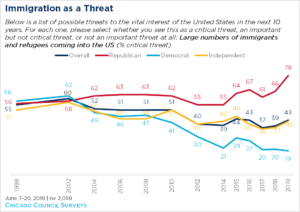Blog Post #3: Prominent Social Issues

As I mentioned in my first blog post, I am adopted, so the social issue of abortion is particularly meaningful to me because if my biological mother had not chosen life, I would not be here today. I do not know the reasons as to why she could not raise me, but I am beyond blessed to have been given the chance to live. I am pro-life, but if I decide to base my project on this social issue, I am interested in analyzing both sides of the issue: those who are pro-choice and those who are pro-life. According to Wikipedia, “pro-choice” means believing that it is a woman’s civil right to decide whether to have an abortion or not since it is her body. Wikipedia also defines “pro-life” as placing emphasis that the growing embryo or fetus has the right to be born and that abortion is the act of killing a life.[1] I would like to research about adoption and the other alternatives to abortion and why people who decide to have an abortion do not choose to give birth to the child and put him or her in an orphanage or in the foster care system, for instance. I do not have much knowledge regarding the topic so I would be extremely interested in collecting and analyzing the results conducted in my project. There are certainly statistics I can use that will strengthen my project if I choose to do it on this topic, and I would construct a survey to gain a better sense of why it is such a prominent social issue. Some statistics include those gathered from New York Times: “‘about 8 in 10 Americans believe abortion is taking a life,” said Ed Goeas, president of the Tarrance Group, a Republican polling firm. ‘What you then have is a discussion about when it is acceptable.’” Additionally, the New York Times quotes Gallup which shows that “about 60 percent of Americans favor access to abortion in the first trimester (or first 12 weeks) of pregnancy, but close to 70 percent think it should be illegal in the second trimester.”[2] I would additionally examine the pros and cons of abortion being illegal and legal. Although abortion is a heated topic, like all social issues, it is important to look at both sides of the problem to gain a better understanding of it.

The social issue of immigration is a leading social issue today, especially in the United States. My parents own a preschool in North Bergen, New Jersey, a town filled with Hispanic immigrants. They help the parents pay for the education of their children with Urban League. Many of the immigrant parents are single and have had their children at a very young age. Most of my family members are immigrants, so I know many stories of the struggles immigrants face in assimilating and trying to adapt to a new way of life. I, too, am an immigrant, so this topic is especially important to me. Immigration is a significant social issue because of the concern of closing boarders and illegal immigrants trying to cross them. Immigration is another intense topic since, according to the Chicago Council on Global Affairs, most Republicans view immigrants and refugees as a threat to the United States, whereas Democrats believe in continuing to embrace immigration as part of the nation’s history by being less controlling regarding border security. There are many statistics that would benefit my project if I were to base it on this social issue, especially since I am looking to analyze the claims made by Republicans and Democrats, including a statistic made by the Chicago Council on Global Affairs: 45% of Americans claim that limiting the amount of immigrants coming to the United States makes the country “safer.”[3] The belief that immigrants are “dangerous” and are “criminals” are occupying many people’s minds, and it is important to look past single stories that we may have heard of immigration and to educate ourselves on the bigger picture as well as on details and specifics.

A third social issue I would like to explore is mental illness. Recently, my church called The Most Blessed Sacrament in Franklin Lakes, New Jersey was burned down by a mentally unstable young man. This arsonist committed a horrible crime, but I sympathize with him. This event impacted me immensely since I have grown up in this church, and to see it in rubble has me destroyed. It also touched me in a way that my eyes have been opened to a world where people are fighting battles on their own that no one else is aware of. Mental illness is a major social issue and if I were to base my project on it, I would focus on how family structure impacts the mental health of a person. A preliminary study conducted by the US National Library of Medicine National Institutes of Health shows that there is a connection between family structure and the levels of behavioral issues in children. They studied how single parents affected the upbringing of a child, and they also collected data on the rates of trauma and hospitalization. One statistic they established is that 71% of children “reported either a parent or a sibling with a psychiatric disorder.” [4] This is an alarming number which makes mental illness an even more urgent cause to worry about. If a child does not have a solid support system in his or her home, the child tends to keep to him/herself and may become anxious, depressed, or develop more advanced conditions of mental illness.
[1] “Abortion Debate.” Wikipedia. Wikimedia Foundation, February 10, 2020. https://en.wikipedia.org/wiki/Abortion_debate.
[2] Leonhardt, David. “Why Abortion Is Not Like Other Issues.” The New York Times, July 13, 2013. https://www.nytimes.com/2013/07/14/sunday-review/why-abortion-is-not-like-other-issues.html.
[3] Kafura, Craig. “Republicans and Democrats in Different Worlds on Immigration.” Chicago Council on Global Affairs, February 3, 2020. https://www.thechicagocouncil.org/publication/lcc/republicans-and-democrats-different-worlds-immigration.
[4] Behere, Aniruddh Prakash, Pravesh Basnet, and Pamela Campbell. “Effects of Family Structure on Mental Health of Children: A Preliminary Study.” Indian journal of psychological medicine. Medknow Publications & Media Pvt Ltd, 2017. https://www.ncbi.nlm.nih.gov/pmc/articles/PMC5559994/.